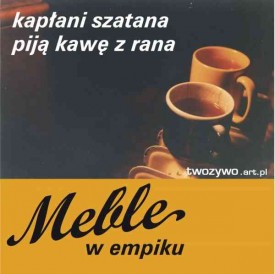Coffee is our main ally; a force that helps us face the day ahead and gently slip into its structure of plans, tasks, and goals.
Aspiring metropolitan cafés serve up coffee in any number of forms and contexts. Many replace quality with appearance, authenticating it with a slick logo, high price, and hip location. In most places, even ones that offer a decent cup of joe, the coffee is just an option, an actor in an at-best secondary role, trying to find a dignified place in a sea of of more attractive, kid- and environment-friendly offerings. Even in cafés, coffee has become a mere accessory, despite investments in more high-tech and more electronic — or sometimes refurbished yet impressive-looking — machines.
 illus. TwożywoWhat apostles of coffee find most upsetting is a situation where hypocrisy goes hand in hand with restrictions. In keeping with today’s health propaganda and political correctness, smokers have taken their cigarettes outside, separating a pair that has spent centuries together in joyful harmony: coffee and cigarettes.
illus. TwożywoWhat apostles of coffee find most upsetting is a situation where hypocrisy goes hand in hand with restrictions. In keeping with today’s health propaganda and political correctness, smokers have taken their cigarettes outside, separating a pair that has spent centuries together in joyful harmony: coffee and cigarettes.
Good coffee doesn't appear to matter as much in Poland, where it has never fully taken root. Like substantive discussions with neighbours, enjoying a leisurely cup of coffee at the nearest corner is a rare activity, one regarded as extravagance or even luxury. Cafés are more like corporate conglomerates attempting to jump onto the eco-hipster bandwagon of fair trade. After all, we’re not in Italy, Spain, or Greece, where sipping coffee in public is a pastime enjoyed at all hours of the day and night by the young and old.
As we enjoy our hot cups of brew, let us submit this situation to analysis. It might turn out that our attitudes towards coffee speak volumes about other areas of our lives as well as our perceptions of the world. A double espresso for you, sir, and a cappuccino for you, madam. Or is it the other way around? Not likely. As the aroma of coffee — naturally or artificially flavoured — wafts over the table, another spirit floats in the air: that of snobbery, either of the cheap and pretentious variety, or the more noble and demanding sort. How do discriminate between different groups of coffee consumers? Are we over-sensitive connoisseurs, addicts, or just poseurs?
1) Technocratic coffee: for those who enjoy the latest technological breakthroughs and drool at the thought of ultra-high-tech, silent machines that make coffee without the effort and mess associated with traditional appliances. Our insulation from the organic dimension of coffee is made up for by the beauty of the shiny, multi-coloured, aluminium capsules that release the aroma in a ruthlessly automatic fashion. But how do we know that’s really coffee in those pellets?
2) Brutal coffee: attempts subtlety with the use of filters and pots, but coffee grinds in a glass doused with boiling water are still the norm, one that many are unwilling to give up. Brutal coffee often appears in its modern form, which — considering its flavour and health benefits — is actually a step backwards. Instant coffee, usually made by freeze-drying real coffee, is popular on planes and trains, in offices (as an inferior form of technocratic coffee), and vending machines. Better than nothing, but not recommended for daily use.
3) Coffee is evil to many of its opponents and people of weak faith. Its first steps on the European continent were not easy, as many thought of it as the drink of the devil. Today, it strikes fear in the hearts of Western hypochondriacs for other reasons. Coffee raises blood pressure, stains teeth, leeches out magnesium and calcium, and is generally unhealthy and unsuitable for children, pregnant women, and anyone who watches their health. Yet we have no choice but to drink it: coffee is an immanent part of our professional and leisure cultures, it smells good and it sets the mood. Decaf or coffee substitute are one way out, but they’ll never replace a real cup of coffee.
4) Coffee as blood: One can’t live without it. It is said that red blood cells are a particularly crucial ingredient in blood, as they are responsible for transporting oxygen. A deficiency of these cells leads to anemia. Those who direct their first morning steps towards the coffee believe that their pitch-black blood cells play the most important role in the circulatory system by anchoring them to the “here” and “now”. For this group, coffee is no mere accessory, but an organic, ever-loyal comrade and fundamental source of energy. They are prepared to make great sacrifices to guarantee a high-quality relationship, depending on the kindness of travelling friends, buying their beans online, looking after antiquated coffee makers or saving up for years to purchase a proper burr grinder. Harmless eccentricity, or snobbery? A necessity of life, rather.
Coffee deserves its own temple, monument, or — lacking that — at least a quite, convenient venue in which it can be properly savoured. It’s hard to estimate just how many days it has saved and how many of us owe it our sanity, clarity of though, and our purpose in life.
translated by Arthur Barys













